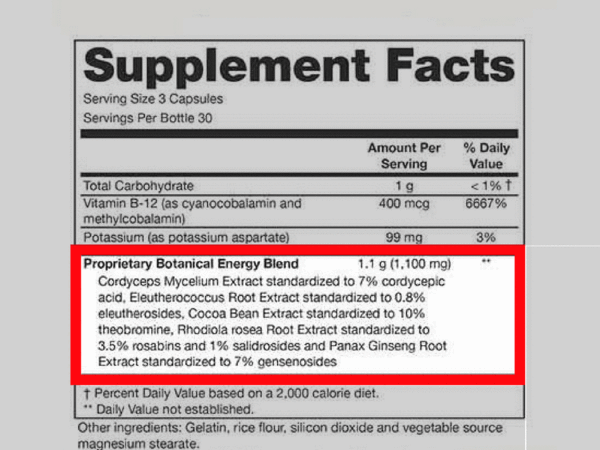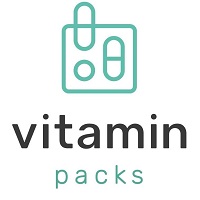This is a post written in collaboration with Vitamin Packs—we’re honored to work with anyone this dedicated to bringing us one step closer to the best version of ourselves. ~ Ed.
~
Vitamins usually come in a colorful container plastered with words that invoke a promise for a better life.
But how do we know if the contents in the container will work, let alone contain the ingredients they promise to, and whether those ingredients are the right balance for our body’s nutritional needs?
I consider myself a fairly well-informed, health-conscious person, and I have to admit that I didn’t have a clue here—I’ve always just trusted seemingly good-quality universal supplements that I can buy from the grocery store or pharmacy to cover my bases adequately.
Turns out it’s not that straightforward, as I recently learned when chatting to the folks at Vitamin Packs.
Like most busy families doing their best to live healthy lifestyles, we all take a multivitamin. There’s one for women (mine), one for men (my husband’s), and one for children aged 3-8 (my two boys). When I was pregnant, I took extra supplements and what I believed to be a good prenatal multivitamin.
I’d say we do pretty well when it comes to our diet, but even then it’s not easy eating perfectly every day. So multivitamins can fill the gaps in our nutrition—but how much can one standard multivitamin (even if it’s gender or age-specific) account for the difference in each of our bodies?
Individualized nutrition is a huge wellness trend for this year, and rightly so—we’re all starting to realize just how unique our individual needs are.
So why aren’t we taking this same approach when it comes to our vitamin supplements?
I’ve just discovered that because of his particular characteristics, my eldest’s son’s nutritional needs might be higher in certain areas than my youngest’s. I’m currently on medication too, and what I didn’t realize until now is that the multivitamin I take interacts with that medication to potentially produce all sorts of side effects: all the way from decreased nutrient absorption to death. Whoa! That’s enough to make me sit up and question my supplement choices.
Considering nearly 50 percent of the U.S. population is taking prescription medications, according to the Centers for Disease Control and Prevention, and 68 percent of Americans are taking dietary supplements, based on Council for Responsible Nutrition (CRN) estimates, it’s downright shocking that most supplement companies conveniently fail to bring up possible interactions with medications.
But companies like Vitamin Packs, who specialize in combing science and technology to provide personalized nutrition, are helping more and more Americans with this, by providing third party certified and bioavailable (or easily broken down in the body) ingredients that don’t form deadly concoctions with our medications.
Take Vitamin Packs’ free online assessment today >>
Their team of expert nutritionists (who are the people you’ll actually reach directly if you call, text, or email) have developed an intelligent algorithm that runs extensive checks on your specific medications and helps make adjustments to your vitamin plan accordingly. They can offer support on the exact balance of nutrients for you, so that you can get only what your body really needs, as well as provide you with missing or depleted nutrients.
It’s important to know that if you are taking prescription medications that there can be interactions between them and natural vitamins and supplements. Vitamin Packs asks about your meds and recommends additional supplementation if a drug depletes your body and deletes any vitamins that may interfere with the action of the drugs—here are some examples:
>> If you’re take statins—to increase your intake of coenzyme Q10 or ubiquinol because the average blood concentration of CoQ10 in blood plasma decreases within 30 days of statin intake by an average of 50 percent. CoQ10 is found in every cell in your body and is necessary to produce energy and to protect your cells from harmful damage. (1) Vitamin D is another one they’ll help you to increase because it can improve muscle related side effects caused by statins. (2)
>> If you’re on an antidepressant—to avoid L-tryptophan, an amino acid supplement, as together they can cause serotonin syndrome which can possibly lead to coma or even death.
>> If you’re on a steroid hormone used to treat certain inflammatory diseases, some autoimmune diseases, and some types of cancer—to supplement with both vitamin D and calcium, as the absorption of both of these is significantly reduced by this medication. This can reduce the chances of bone loss and adding vitamin D with the calcium can have a greater impact on calcium absorption. (4-10)
>> If you’re on thyroid replacement hormones—to know when to time your supplements with your medication, as soy, iron, and calcium if taken within four hours of your medication can reduce absorption of the thyroid hormone, making it less effective. (11-20)
CBS This Morning recently aired an interview with their doctor discussing these potentially dangerous interactions.
Discover your personal drug-nutrient interactions, take Vitamin Packs’ free online assessment today >>
The other huge eye-opener for me was learning that some companies don’t want you to know that they are bound to very little regulation to ensure the ingredients in their vitamins actually work the way they say they will. Sure, the Food and Drug Administration (FDA) holds companies accountable by saying that their labels can’t make false claims, but because nothing has to be tested before it enters the market, many companies fall short.
If you look at the labels on your vitamin bottles or packs, you may see the term “proprietary blend” listed in the ingredients section:

A proprietary blend is simply is a combination or mixture of several herbs, minerals, or vitamins within a supplement. It may sound harmless, but here’s the thing: every manufacturer is required by the FDA to list all of their ingredients, and these ingredients are required by law to include the amount by weight next to the name—unless it is a proprietary blend, then manufacturers can include the weight as a total amount. Proprietary blends therefore have no standardization and manufacturers can get away with far more filler product than is to your benefit. (21)(22).
Which is why it is important that we choose supplements that are third party tested and Current Good Manufacturing Practice (CGMP) certified. Compliance companies like NSF International currently certify using three tiered levels of compliance.
- Good Manufacturing Practices (GMPs)
- Next, supplement manufacturers can certify their products to NSF/ANSI 173: Dietary Supplements, the official American National Standard for dietary supplement products.
- Finally, the highest level of independent, third-party certification—which is what Vitamin Packs have—requires testing on a lot-by-lot basis.
So, let’s say you buy a supplement and it is third party certified, the next thing you have to worry about is quality, and unless you are well-versed in biochemistry, this may become hard to follow.
In short, not all vitamins are created equal:
There are several variables which play a role in what your body is actually getting from a supplement: nutrient quality, fillers (those hidden bulking agents in proprietary blends), and molecularly bound forms of vitamins, for example Vitamin B12, which is almost never found in its chemically pure form as it is usually bound to other molecules, and the B12 type depends on which molecules it is bound to.
Which is why “personalized nutrition shouldn’t be taken lightly. It’s not a catchy-named pack of vitamins or nutrition plans curated from a few questions about how you want to feel; it needs to include everything that makes you unique, down to the medications prescribed by your doctor,” says Dr. Michael Roizen, original chief wellness officer at the Cleveland Clinic, co-author of the new book, Age-Proof: Living Longer without Running Out of Money or Breaking a Hip and Vitamin Packs science advisory board member.
There are also certain forms of vitamins that may be better absorbed, less harmful, and more therapeutic to our body than others.
For instance, Coq10 (ubiquinone) in its reduced form, Ubiquinol may be more readily absorbed if you are over the age of 30. Vitamin K2 may have more benefits than its counterpart K1 in terms of heart and bone health. K2 can cause a reduction of calcification deposits in the arteries that contribute to plaque. This in turn lowers the risk of heart disease. (23)
Naturally occuring Methylated folate or 5-MTHFR may be more readily absorbed than synthetic folic acid (common in many pregnancy supplements) in some people, especially those with the MTHFR Polymorphism gene, which 40-50 percent of people with Northern European descent have. (24)
“Nutrition is more than a one-size-fits-all approach to health—it’s about understanding how your body works, what fuels it for success and how it interacts with prescription medications,” says Vitamin Packs CEO, Jason Brown.
Vitamin Packs is pretty uniquely capable of providing “only what your body needs—no more, no less.” Their promise is to bring you one step closer to the best version of yourself. Their mission is to use their wisdom, expertise, technology, and compassion to support each person’s pursuit of a better self.
Vitamin Packs combine technology and science to bring you one step closer to your best self:
Their unique algorithm has been carefully developed in consultation with their medical advisory board and take into consideration more than 400 drugs an individual may take, so their recommendation remains safe and compliant with potential drugs interactions. It takes 3-5 minutes to take their online assessment and you get your personal recommendation (one of up to five trillion possible) almost instantly upon completion.
Their medical advisory board combines the wisdom of doctors and in-house nutritionists who answer customer calls and questions regarding their recommendations directly, five days a week, from 6:00 a.m. to 6:00 p.m. PST. Between them, their scientific advisory board have 100,000 one-on-one patient visits and 145 years experience under their belts. They have written 165 peer-reviewed scientific papers, served as editors of medical journals, authored New York Times best-selling medical and consumer health books, and are currently serving as leaders at scientific and medical organizations, including the FDA.
But what I am most impressed by when speaking to Vitamin Packs is their humanity.
“Every order we receive is carefully reviewed as if we were curating recommendations for a family member and our policies reflect this—complete personalization, free shipping, free returns, no questions asked.” says Jason Brown, CEO. They treat each individual like a unique human being, which of course we all are! They demonstrate genuine caring in helping us achieve our best possible health, with an extra measure of kindness, compassion, and support.
Beyond this, they are doing their part to improve the health of those who can’t afford to do it themselves: for every purchase made, they donate 1% of their total proceeds to Vitamin Angels, a charity dedicated to reducing malnutrition in mothers and children in need. They’ve already helped 80,000 children and families around the world, and counting.
Feel well and do good, take Vitamin Packs’ free assessment today >>
The whatwhenhow:
Vitamin Packs delivers a 28-day supply of vitamins (made from all natural ingredients), provided in personalized packs (branded AM, PM, or Night depending on your recommendation), processed within 12 hours, and shipped for free (minimum $20 order), from their facility in Snoqualmie, Washington State, delivered to your door within 3-5 days across all 50 states, depending on where in the country you are.
All their supplements are pharmaceutical grade, quality tested, and 100 percent guaranteed (free return or full refund within 30 days of purchase).
The initial monthly shipment comes with supplement cards for each vitamin, explaining exactly where each supplement and its ingredients come from. It also includes a travel bag so your vitamins can follow you wherever you go, no matter what you do. (They’re working on biodegradable packaging options as we speak and use minimal cardboard packaging in shipping.)
They also offer 50 percent off your first order.
And the even better news, for me and my busy family in particular, is that they’ve just launched a new Foundational Multi-Vitamin™ using the highest quality ingredients with a high level of bioavailability. And for future and new moms, they have a Pre-Post Natal Multi-Vitamin™.
If the days of a one-size-fits-all diet are over, then the days of a one-size-fits-all vitamin should be too. Discover what your unique body really needs:
Take Vitamin Packs’ free assessment today >>
~
Brand Content Editor: Khara-Jade Warren
Additional Links:
CBS This Morning Interview
LA Times Article
Geek Wire Article
References:
(1) Rundek T, Naini A, Sacco R, et al. Atorvastatin decreases the coenzyme Q10 level in the blood of patients at risk for cardiovascular disease and stroke. Arch Neurol 2004;61:889-92.)
(2) https://www.vitamindcouncil.org/new-study-suggests-vitamin-d-supplementation-reduces-side-effects-from-statins/
(3) Bhatti JZ, Hindmarch I. Vinpocetine effects on cognitive impairments produced by flunitrazepam. Int Clin Psychopharmacol 1987;2:325-31.
(4) Hahn TJ, Halstead LR, Baran DT. Effects off short term glucocorticoid administration on intestinal calcium absorption and circulating vitamin D metabolite concentrations in man. J Clin Endocrinol Metab 1981;52:111-5.
(5) Trovato A, Nuhlicek DN, Midtling JE. Drug-nutrient interactions. Am Family Phys 1991;44:1651-8.
Chesney RW, Mazess RB, Hamstra AJ, et al. Reduction of serum-1,25-dihydroxyvitamin-D, in children receiving glucocorticoids. Lancet 1978;ii:1123-5.
(6) Nielsen HK, Eriksen EF, Storm T, Mosekilde K. The effects of short-term, high-dose prednisone on the nuclear uptake of 1,25-dihydroxyvitamin D3 in monocytes from normal human subjects. Metabolism 1988;37:109-14.
(7) Avioli LV. Serum 25-hydroxyvitamin D concentrations in patients receiving chronic corticosteroid therapy. J Lab Clin Med 1977;23:399-404.
(8) Buckley LM, Leib ES, Cartularo KS, et al. Calcium and vitamin D3 supplementation prevents bone loss in the spine secondary to low-dose corticosteroids in patients with rheumatoid arthritis. A randomized, double-blind, placebo-controlled trial. Ann Intern Med 1996;125:961-8.
(9) Amin S, LaValley PM, Simms RW, Felson DT. The role of vitamin D in corticosteroid-induced osteoporosis. Arthritis Rheum 1999;42:1740-51.
(10) Kung AWC, Pun KK. Bone mineral density in premenopausal women receiving long-term physiological doses of levothyroxine. JAMA 1991;265:2688-91.
(11) Schneider DL, Barrett-Connor EL, Morton DJ. Thyroid hormone use and bone mineral density in elderly men. Arch Intern Med 1995;155:2005-7.
(12) Franklyn JA, Betteridge J, Daykin J, et al. Long-term thyroxine treatment and bone mineral density. Lancet 1992;340:9-13.
(13) Schneyer CR. Calcium carbonate and reduction of levothyroxine efficacy. JAMA 1998;279:750.
(14) Singh N, Singh PN, Hershman JM. Effect of calcium carbonate on the absorption of levothyroxine. JAMA 2000;283:2822-5.
(15) Zamfirescu I, Carlson HE. Absorption of levothyroxine when coadministered with various calcium formulations. Thyroid 2011;21:483–6.
(16) Campbell NR, Hasinoff BB. Iron supplements: A common cause of drug interactions. Br J Clin Pharmacol 1991;31:251-5.
(17) Campbell NR, Hasinoff BB, Stalts H, et al. Ferrous sulfate reduces thyroxine efficacy in patients with hypothyroidism. Ann Intern Med 1992;117:1010-3.
(18) Jabbar MA, Larrea J, Shaw RA. Abnormal thyroid function tests in infants with congenital hypothyroidism: the influence of soy-based formula. J Am Coll Nutr 1997;16:280-2.
(19) https://www.ncbi.nlm.nih.gov/pubmed/24494987
(20) https://www.ncbi.nlm.nih.gov/pubmed/19917061
(21) https://www.fda.gov/Food/DietarySupplements/
(22) http://www.nsf.org/
(23) http://www.atherosclerosis-journal.com/article/S0021-9150(08)00507-8/fulltext
(24) http://portals.clevelandclinic.org/portals/66/TechnicalBrief/mthfr-81692.PDF
~
Brand Content Editor: Khara-Jade Warren






Read 0 comments and reply